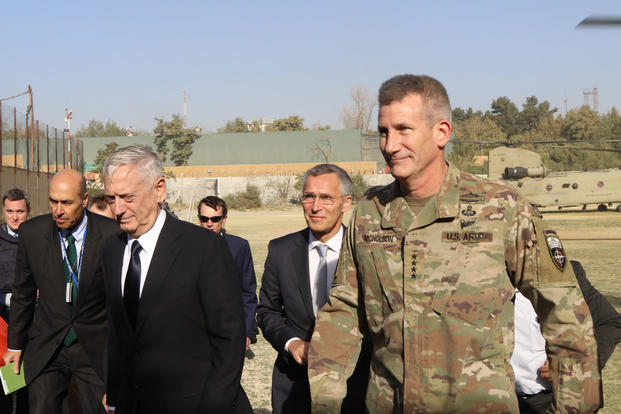Defense Secretary Jim Mattis said Wednesday that an attack on the Kabul airport with mortars, rocket-propelled grenades and suicide vests hours after his arrival only heightened U.S. resolve to defeat the Taliban.
"So it is what it is, but it's also the reason why we band together, and we don't question what we're doing here," Mattis said at a news conference with NATO Secretary Jens Stoltenberg and Afghan President Ashraf Ghani at Kabul's heavily-guarded presidential palace, miles away from the airport.
Mattis said he had been unaware the airport had been hit until he began hearing initial press reports.
Both the Taliban and the Afghan offshoot of the Islamic State of Iraq and Syria claimed responsibility for the attack on the Hamid Karzai international airport, but Mattis put the blame on the Taliban. "This is a classic definition of what the Taliban are up to right now," he said.
Taliban spokesman Zabiullah Mujahadid said in a Tweet that Mattis' plane had been the target of the attack. Mattis and his team arrived in Kabul on the unscheduled visit after talks on defense issues in India.
Afghan officials said hangars and several helicopters at the airport were damaged in the attack in which an estimated 40 munitions were fired -- mostly rocket-propelled grenades.
The Afghan Interior Ministry said one Afghan civilian was killed and at least 11 others were injured after an insurgent rocket hit a house near the combined civil and military airport. Three of the attackers were also believed to have been killed.
Gunmen holed up in a house near the airport fought with Afghan security forces through most of the day and an airstrike by a coalition aircraft went awry, causing several civilian casualties, Afghan officials said.
A statement by the U.S.-led NATO Resolute Support mission said that airstrike called in to support a special Afghan police unit at the airport suffered a "missile malfunction."
"Resolute Support deeply regrets the harm to noncombatants," the statement said. "We take every precaution to avoid civilian casualties, even as the enemies of Afghanistan continue to operate in locations that deliberately put civilians at very high risk."
Mattis later left Kabul enroute north to the Bagram airfield where he was to meet with U.S. troops.
Mattis and Stoltenberg met with Ghani to finalize plans to send more than 3,000 additional U.S. troops to Afghanistan to boost the U.S. troop total to about 12,000, although the actual count on the ground can sometimes be higher.
Under the plan that Nicholson has argued for since mid-February, the U.S. troops would continue their main train, advise and assist role while focusing more on counter-terror activities.
The effort would be supported by increased airpower and include more pressure on Pakistan to crack down on Taliban safe havens.
In supporting the plan in August, President Donald Trump, who acknowledged that he had considered a full withdrawal of U.S. troops, said he wanted more emphasis on killing terrorists than on nation building.
In his remarks in Kabul, Mattis said that the U.S. would do "everything humanly possible" to prevent civilian casualties. "We are here to protect the Afghan people while we attack the terrorists."
Despite the airport attack, the Taliban "will find the Afghan security forces continuing on the offensive against them in every district of the country right now."
Ghani said the attack was "a sign of weakness, not strength" on the part of insurgents. Stoltenberg said that "If NATO forces leave too soon, there is a risk Afghanistan may return to a state of chaos and once again become a safe haven for international terrorism."
It was not the first time a U.S. Defense Secretary's arrival in Afghanistan has led to an attack on an airport in the 16-year-old war.
In 2012, a suicide truck bomber attacked the airfield at Camp Bastion in southwestern Helmand province, killing a U.S. service member and wounding three others, before then-Defense Secretary Leon Panetta's plane arrived.
--Richard Sisk can be reached at Richard.Sisk@Military.com.




























